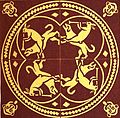The calends or kalends (Latin: kalendae) is the first day of every month in the Roman calendar. The English word "calendar" is derived from this word...
4 KB (528 words) - 15:26, 2 November 2023
Month (section Calends, nones, and ides)
The Romans divided their months into three parts, which they called the calends, the nones, and the ides. Their system is somewhat intricate. The ides...
57 KB (4,472 words) - 11:40, 20 July 2024
and Q. K survived only in a few fossilized forms, such as Kalendae, "the calends". After Greek words were taken into Latin, the kappa was transliterated...
17 KB (1,434 words) - 08:42, 4 July 2024
New Year's Day (redirect from January calends)
In the Gregorian calendar, New Year's Day is the first day of the calendar year, 1 January. Most solar calendars (like the Gregorian and Julian) begin...
55 KB (6,279 words) - 11:27, 21 July 2024
List of idioms of improbability (redirect from Greek calends)
the school week). The expression aux calendes grecques ("to the Greek Calends") was also used for indefinite postponement, derived from the ancient Latin...
20 KB (2,449 words) - 07:57, 28 June 2024
Pontus (modern Amasya, Turkey) preached a sermon against the Feast of Calends ("this foolish and harmful delight") that describes the role of the mock...
18 KB (2,394 words) - 11:27, 20 July 2024
horses' Easter". The Latin expression ad kalendas graecas "to the Greek calends" The German "Wenn Schweine fliegen können!" is identical with the English...
11 KB (1,173 words) - 02:59, 7 June 2024
at least the 1st century AD. Roman months had three important days: the calends (first day of each month, always in plural), the ides (13th or 15th of...
189 KB (21,505 words) - 12:16, 14 July 2024
kalendas graecas at the Greek Calends i.e., "when pigs fly". Attributed by Suetonius in The Twelve Caesars to Augustus. The Calends were specific days of the...
2 KB (3,628 words) - 12:56, 18 May 2024
Roman Calendar in the 11th century and celebrated on the sixth day to the Calends of March (24 February usually, but 25 February in leap years). In the revision...
13 KB (1,344 words) - 21:17, 21 May 2024






